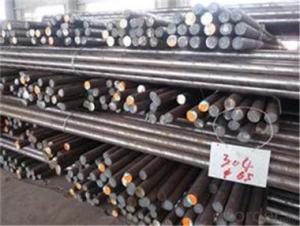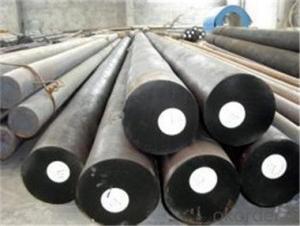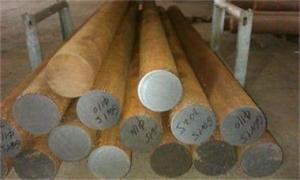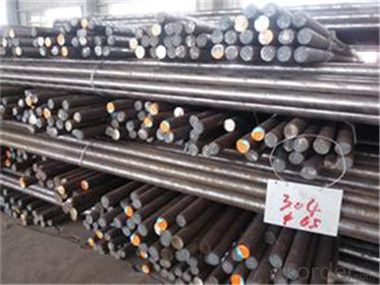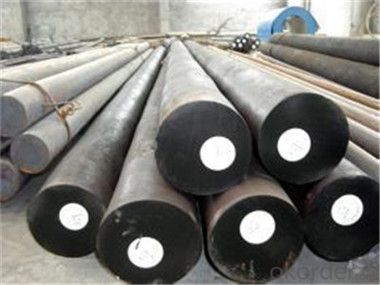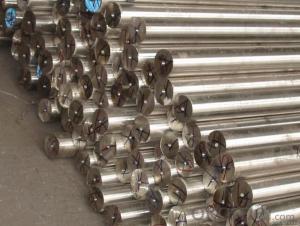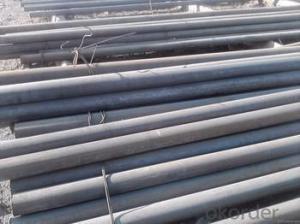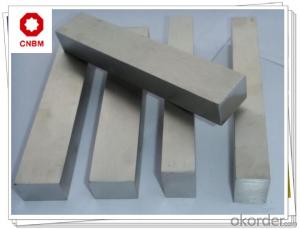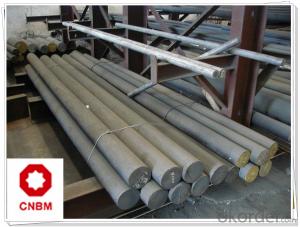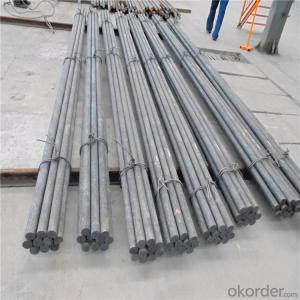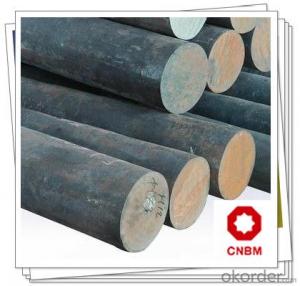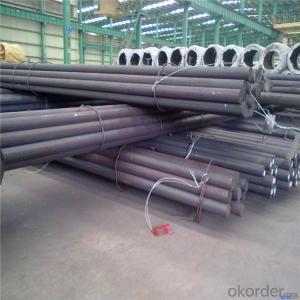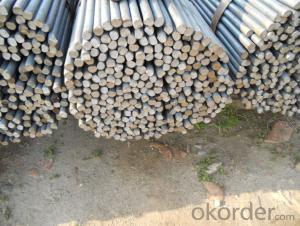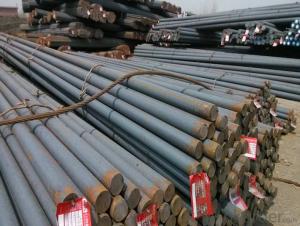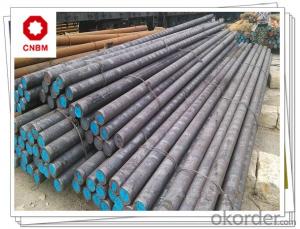S20C Carbon Steel Round Bars in China with High Quality
- Loading Port:
- Tianjin
- Payment Terms:
- TT OR LC
- Min Order Qty:
- 90 m.t.
- Supply Capability:
- 2000000 m.t./month
OKorder Service Pledge
OKorder Financial Service
You Might Also Like
Description of steel round bar:
1.Diameter 80 to 800 mm
2.Black or Bright surface
3.Annealed or Quenched and tempered provided
4.Cutting service provide
Festures of steel round bar:
4340 Forged Round Steel Bar
1.Dia 80-800mm Length:2000-13000mm or as required
2.Technique:Forged
3.Delivery Time:45 days
Specifications of steel round bar:
Description |
carbon steel rod,carbon steel shaft,mild steel bar, mild steel shaft,ms bar | |
Material | ASTM | 1005,1006,1008,1010 |
DIN | Ck10,Ck15,Ck22,Ck25,Ck30,Ck35 | |
BS | 040A04,095M15,045M10,080A40, | |
Standard | GB/T799,ASTM A29,A108,A321,A575, | |
Section shape |
Round | |
Length |
As your required | |
Application | Carbon steel rod applies to chemical industry, shipping industry, manufacturing industry,construction,decorate Industry,electric power, pump shafts, sanitary wares,furniture handles,boiler,high temperature resistant,low temperature resistant, corrosion resistant. | |
Images of steel round bar:
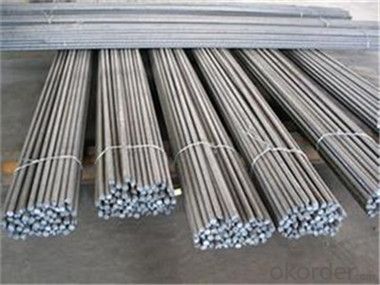
FAQ:
1. How long is the lead time?
Delivery time: 45 days after order confirmed.
2. What payment term do you accept?
Payment: T/T or L/C at sight.
- Q: What is the difference between a solid steel round bar and a hollow steel round bar?
- A solid steel round bar is a cylindrical metal rod that has a uniform diameter throughout its entire length. It is made of solid steel, meaning it does not have any hollow or empty space inside. On the other hand, a hollow steel round bar also has a cylindrical shape but contains a hollow or empty space within its center. This hollow space can vary in size, depending on the specific design and purpose of the hollow round bar. The main difference between the two lies in their structural integrity and weight-bearing capacity. A solid steel round bar offers greater strength and stability compared to a hollow steel round bar. This is because the solid bar is made of a continuous steel material, making it more resistant to bending, twisting, or deforming under pressure. It is commonly used in applications where high strength and durability are required, such as construction, engineering, and manufacturing industries. In contrast, a hollow steel round bar may have reduced strength and load-bearing capacity due to the presence of the hollow space within. However, the hollow design provides certain advantages in terms of weight, cost, and flexibility. The hollow space allows for a lighter overall weight of the bar, making it more suitable for applications where weight is a critical factor, such as aerospace or automotive industries. Additionally, the hollow space can be utilized for various purposes, such as passing through electrical wires or fluids, providing a channel for ventilation, or even reducing material costs by using less steel. Ultimately, the choice between a solid steel round bar and a hollow steel round bar depends on the specific requirements of the application. If strength and stability are paramount, a solid bar would be the preferred choice. Conversely, if weight reduction, cost-efficiency, or additional functionality is desired, a hollow bar may be more suitable.
- Q: Can steel round bars be used in the energy industry?
- Yes, steel round bars can be used in the energy industry. Steel round bars are commonly used in various applications within the energy industry due to their high strength, durability, and resistance to corrosion. They are used in the construction of power plants, oil rigs, pipelines, and other energy infrastructure projects. Steel round bars are also used in the manufacturing of machinery and equipment used in the energy industry, such as turbines, generators, and pumps. Additionally, steel round bars are often utilized in the production of renewable energy technologies, including wind turbines and solar power systems. Overall, steel round bars are a versatile and reliable material that can effectively meet the demanding requirements of the energy industry.
- Q: How do you calculate the torsional strength of a steel round bar?
- To calculate the torsional strength of a steel round bar, you need to consider its material properties, such as the shear modulus and the cross-sectional area of the bar. The torsional strength can be determined using the formula T = (G * J * tau) / L, where T is the torsional strength, G is the shear modulus, J is the polar moment of inertia, tau is the shear stress, and L is the length of the bar.
- Q: What is the tensile strength of round steel bars of diameter 28?
- The tensile strength of round steel bars of diameter 28 is 27079.36~33849.2 kg. It is explained as follows: the material of rebar is generally Q235-A carbon structural steel, its yield strength is 235 MPa, tensile strength is 441~550 MPa, and it is 44~55 kg / mm2. The cross-sectional area of 28 mm in diameter is about 615.44 mm2, and its tensile strength is about 27079.36~33849.2 kg.
- Q: What is the maximum sulfur content allowed for steel round bars?
- The allowed maximum sulfur content for steel round bars can vary depending on the specific grade and specification. Generally, the control of sulfur content in steel is essential to ensure the material's quality and good machinability. For most commercial grades of steel round bars, the maximum sulfur content is typically restricted to approximately 0.05% to 0.08%. Nevertheless, it is crucial to acknowledge that specific specialized grades or applications may possess distinct limits or requirements. It is advisable to refer to the appropriate standards or specifications for the specific grade of steel round bars to ascertain the maximum allowable sulfur content.
- Q: Can steel round bars be used for making suspension components?
- Yes, steel round bars can be used for making suspension components. Steel round bars are often utilized in the manufacturing of suspension components due to their excellent strength, durability, and resistance to fatigue. They provide the necessary support and stability required for suspension systems to function effectively.
- Q: Can steel round bars be extruded?
- Steel round bars cannot be extruded; instead, they are typically produced through a different process called hot rolling. In hot rolling, a cylindrical billet is heated and passed through a series of rollers to achieve the desired diameter and length. Extrusion, on the other hand, is a manufacturing process that involves forcing material through a die to create specific shapes or profiles. While steel can be extruded into various shapes such as tubes, channels, or angles, round bars are not typically produced in this way.
- Q: Can steel round bars be used in marine environments?
- Steel round bars can indeed be utilized in marine settings. Nonetheless, it is crucial to select the appropriate steel variant that is specifically engineered for marine purposes. Among the various options, stainless steel stands out as the most frequently utilized due to its ability to resist corrosion. This is primarily due to its high chromium content, which facilitates the formation of a protective oxide layer on the steel's surface, thereby safeguarding it against corrosion caused by saltwater and other harsh elements. Moreover, stainless steel round bars are renowned for their robustness and durability, making them well-suited for an array of marine applications such as ship construction, offshore structures, and marine equipment. To ensure the enduring performance of steel round bars in marine environments, regular maintenance and proper care are imperative.
- Q: What are the advantages of using spring steel round bars?
- There are several advantages of using spring steel round bars: 1. High strength: Spring steel round bars are known for their exceptional strength. They are designed to withstand high levels of stress and strain, making them ideal for applications that require strong and durable materials. 2. Flexibility: Spring steel round bars have excellent flexibility, allowing them to be easily shaped, bent, or formed without losing their strength. This flexibility makes them suitable for various manufacturing processes and applications. 3. Superior elasticity: Spring steel round bars possess excellent elasticity, enabling them to return to their original shape after being subjected to deformation or stress. This elasticity is crucial in applications where materials need to absorb shocks or vibrations. 4. Resistance to fatigue: Spring steel round bars are highly resistant to fatigue and can withstand repeated cycles of loading and unloading without losing their mechanical properties. This resistance to fatigue ensures their reliability and longevity, making them suitable for demanding applications. 5. Excellent toughness: Spring steel round bars exhibit exceptional toughness, which means they can withstand sudden impact or heavy loads without breaking or fracturing. This characteristic makes them suitable for applications that require materials to withstand harsh environments or heavy-duty operations. 6. Corrosion resistance: Many spring steel round bars are made from corrosion-resistant alloys, providing protection against rust and other forms of corrosion. This corrosion resistance makes them suitable for applications where exposure to moisture or corrosive substances is expected. 7. Cost-effective: Spring steel round bars offer a cost-effective solution compared to other types of steel or materials. Their durability and longevity reduce the need for frequent replacements, ultimately saving costs in the long run. In summary, the advantages of using spring steel round bars include high strength, flexibility, superior elasticity, resistance to fatigue, excellent toughness, corrosion resistance, and cost-effectiveness. These properties make them a preferred choice in various industries, including automotive, construction, manufacturing, and aerospace.
- Q: Are steel round bars suitable for conveyor belt applications?
- Yes, steel round bars are suitable for conveyor belt applications. They are durable, strong, and resistant to wear and tear, making them ideal for handling heavy loads and continuous movement in conveyor systems. Additionally, steel round bars can be easily fabricated and customized to meet specific application requirements, making them a reliable choice for conveyor belt applications.
Send your message to us
S20C Carbon Steel Round Bars in China with High Quality
- Loading Port:
- Tianjin
- Payment Terms:
- TT OR LC
- Min Order Qty:
- 90 m.t.
- Supply Capability:
- 2000000 m.t./month
OKorder Service Pledge
OKorder Financial Service
Similar products
Hot products
Hot Searches
Related keywords
